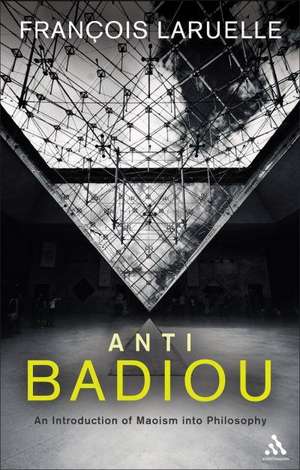Anti-Badiou: The Introduction of Maoism Into Philosophy
Autor Francois Laruelle, Franocois Laruelle Traducere de Robin Mackayen Limba Engleză Hardback – 13 feb 2013
Preț: 226.02 lei
Preț vechi: 373.79 lei
-40% Nou
Puncte Express: 339
Preț estimativ în valută:
43.25€ • 44.88$ • 36.15£
43.25€ • 44.88$ • 36.15£
Carte disponibilă
Livrare economică 24 februarie-10 martie
Preluare comenzi: 021 569.72.76
Specificații
ISBN-13: 9781441195746
ISBN-10: 1441195742
Pagini: 288
Dimensiuni: 132 x 201 x 28 mm
Greutate: 0.43 kg
Ediția:First Tion
Editura: Bloomsbury Academic
Locul publicării:London, United Kingdom
ISBN-10: 1441195742
Pagini: 288
Dimensiuni: 132 x 201 x 28 mm
Greutate: 0.43 kg
Ediția:First Tion
Editura: Bloomsbury Academic
Locul publicării:London, United Kingdom
Caracteristici
Represents an original and timely reflection on some key contemporary concerns in philosophy.
Notă biografică
François Laruelle is Emeritus Professor at the University of Paris Ouest, Nanterre La Défense (Paris X) and lectures at the Collège International de Philosophie. He is the creator of the concept of 'non-philosophy', author of over twenty books, and director of L'Organisation Non-Philosophique Internationale. Robin Mackay is a philosopher and director of the UK arts organisation Urbanomic. He is an Honorary Research Fellow in Fine Art at the University of Kent, UK.
Cuprins
Preface: The Re-education of Philosophy by Mathematics: Purification and Terror \ Introduction \ 1. A Short Synoptic Parallel \ 2. Modern Party Positions in Philosophy \ 3. The Old and New Relationship Between Science and Philosophy \ 4. Matrices and Principles \ 5. Subtraction and Superposition \ 6. Philosophy and Mathematics in the Mirror \ 7. Ontology and Materiality \ 8. Philo-Fiction \ Notes \ Index
Recenzii
The two most important living French theorists finally meet head to head, Badiou the best known and Laruelle the least. What results is a true disagreement, the first in a very long time. But don't expect the usual insults: Badiou as anachronistic Maoist, or Badiou as unrepentant Platonist. Laruelle's dagger is sharper and more deadly, for his target is Badiou the philosopher!
The philosophy of Alain Badiou has been a constant source of authority for new directions in philosophy and related disciplines since the publication of his Being and Event. But in a polemic that rises to the challenge of Badiou’s own, François Laruelle shows us why we should be wary of yet another philosopher claiming to give voice to the event. For this is but a ruse of power where philosophy, seeming to submit itself to the non philosophical, reasserts its mastery in being the only possible voice for the event. And while Badiou’s Maoism is criticized here, Laruelle takes up the famous dictum of Mao and himself struggles on two fronts, critiquing Badiou the Philosopher and developing his own non-standard philosophy comparing each along the way. Bridging the critical work of Philosophies of Difference with his most recent forays into a unified theory of philosophy and science, this excellent translation of Anti-Badiou by Robin Mackay will shake the faith of the philosophers that everything is philosophizable.
In Robin MacKay's excellent translation, we see Laruelle's performative thought at work in pristine form, taking what poses today to be the philosophy of its age - Badiouism - and re-envisioning it as one part of the Real rather than its whole. Throughout, we are shown where Badiou and Laruelle, so similar in respect to vocabulary, yet worlds apart in terms of ambition, fundamentally differ: where the one embraces all human practice under its philosophical authority, the other opens this philosophy up to the myriad mutations of non-standard thinking. The stance of Anti-Badiou is not to negate or replace Badiou's picture of reality with another, but only to see it as one amongst many within a democracy of thought.
The philosophy of Alain Badiou has been a constant source of authority for new directions in philosophy and related disciplines since the publication of his Being and Event. But in a polemic that rises to the challenge of Badiou’s own, François Laruelle shows us why we should be wary of yet another philosopher claiming to give voice to the event. For this is but a ruse of power where philosophy, seeming to submit itself to the non philosophical, reasserts its mastery in being the only possible voice for the event. And while Badiou’s Maoism is criticized here, Laruelle takes up the famous dictum of Mao and himself struggles on two fronts, critiquing Badiou the Philosopher and developing his own non-standard philosophy comparing each along the way. Bridging the critical work of Philosophies of Difference with his most recent forays into a unified theory of philosophy and science, this excellent translation of Anti-Badiou by Robin Mackay will shake the faith of the philosophers that everything is philosophizable.
In Robin MacKay's excellent translation, we see Laruelle's performative thought at work in pristine form, taking what poses today to be the philosophy of its age - Badiouism - and re-envisioning it as one part of the Real rather than its whole. Throughout, we are shown where Badiou and Laruelle, so similar in respect to vocabulary, yet worlds apart in terms of ambition, fundamentally differ: where the one embraces all human practice under its philosophical authority, the other opens this philosophy up to the myriad mutations of non-standard thinking. The stance of Anti-Badiou is not to negate or replace Badiou's picture of reality with another, but only to see it as one amongst many within a democracy of thought.
